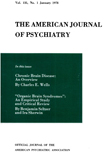PSYCHOLOGICAL TESTS IN THE SELECTION AND PLACEMENT OF PSYCHIATRIC AIDES
Abstract
This paper describes the utilization of 2 psychological tests (Revised Beta Examination and Multiple Choice Rorschach) in the prediction of successful psychiatric aides. Psychiatric aides, 113 in number, were first classified into good and poor employees. Psychological tests were unsuccessful in discriminating between these 2 groups. However, when these 2 groups were refined into a definitely good group and a definitely poor group by eliminating marginal employees, psychological tests selected 32% of these very poor employees while only 5% of the very good employees were falsely identified. An attempt was also made to identify the charge attendant group but this was unsuccessful. Present findings indicate that further research utilizing a more extensive battery of psychological tests should lead to even more fruitful results in the problem of selection and placement of psychiatric aides.
Access content
To read the fulltext, please use one of the options below to sign in or purchase access.- Personal login
- Institutional Login
- Sign in via OpenAthens
- Register for access
-
Please login/register if you wish to pair your device and check access availability.
Not a subscriber?
PsychiatryOnline subscription options offer access to the DSM-5 library, books, journals, CME, and patient resources. This all-in-one virtual library provides psychiatrists and mental health professionals with key resources for diagnosis, treatment, research, and professional development.
Need more help? PsychiatryOnline Customer Service may be reached by emailing [email protected] or by calling 800-368-5777 (in the U.S.) or 703-907-7322 (outside the U.S.).



